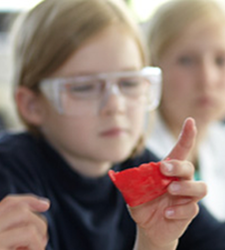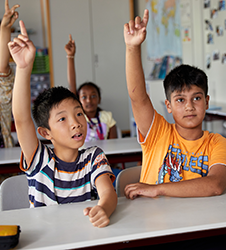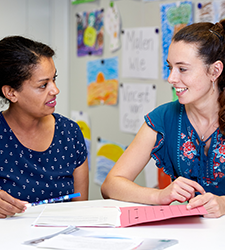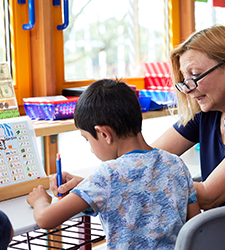Projects

StaLApp
The StarLApp project is about the research-based development and qualitative research of the pre-version of an app for statistical learning in primary schools. The app is to be designed with regard to a learning path derived from theory and encourage learners to reason with statistical data.

Step-by-Step
A broad variety of professional modules, based on the psychoanalytical and interdisciplinary trauma research on the one hand and socio-pedagogical and educational concepts on the other hand, has been intended to offer “first steps” as a sort of first aid in the initial refugee reception Michaelisdorf and to initiate “second steps” to support the immediate and sustaining integration into Germany at the same time.

Stereo-Disk
The project analyses the significance of stereotypes for the quality of support-related diagnostics in the inclusive school context and develops support formats that reduce their influence.

Stereo-no-GO
The Stereo-no-GO project investigates gender and background inequalities in STEM and participation in gifted education programmes.

Strive-Up
The project examines the ideas parents of 6-10 year old children have about their child’s future social status (desire to maintain status vs. desire for upward mobility). We analyse to what extent the desire to maintain status vs. the desire for upward mobility differs according to socio-economic status (SES) and migration background, and what role this desire for status plays in parents’ educational aspirations and in the educational decisions made by families.

TAM
The aim is to investigate the developmental trajectories of cognitive and motor adaptation across childhood, adolescence, young adulthood and old age. We have developed a new task that has proven to be appropriate and sensitive for investigating developmental and individual differences within specific age groups.

TeWiPrax
In the TeWiPrax project, researchers and teachers from the group „Sprachförderung/Mehrsprachigkeit“ of the “Campusschulen” program collaboratively develop and test materials that support secondary school students in understanding scientific texts. A particular focus is on academic and subject-specific vocabulary.

TRIO
The TRIO project examines the effects of a joint professionalization of kindergarten teachers and elementary school teachers in the field of language education.

TschAu
The project aims to develop a standardized achievement test for students in grades three to six, which can be used to assess specific competences and impairments in written expression.

ÜFA
The project ÜFA is a nationwide longitudinal survey about conditions of employment of professionals in early childhood education.